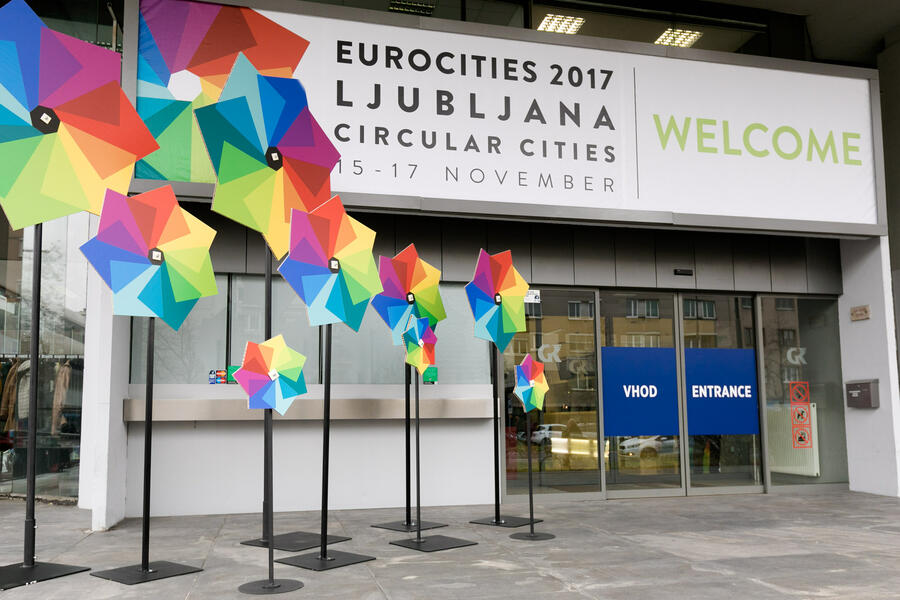EUROCITIES conference
The EUROCITIES conference started in Ljubljana with circular economy as its main theme. There are approximately 600 participants from around Europe in attendance.

In the introduction conference participants were addressed by Mayor Zoran Janković who underscored the importance of cities in ensuring the quality of life for citizens also for future generations and pointed out two main challenges we are currently facing: climate change on the one side, wars and terrorism on the other. He added that we can only fight with these challenges through cooperation.
Daniël Termont, President of EUROCITIES and Mayor of Gent, accentuated in his introductory speech the future significance of the transition to circular economy and emphasised that cities show more ambition in this field than countries. He added that in future cities will have to reorganise themselves and cooperate with each other to attain the set sustainable goals. »Cooperation is key,« Termont stressed and added that cities are willing to learn from each other and mutually adopt good practises to help their citizens.
Conference participants were also greeted by Secretary General of EUROCITIES Ana Lisa Boni who specifically thanked Mayor Zoran Janković for transforming Ljubljana into a sustainable jewel. Among other things she emphasised that 2017 represents the door into the future and that it is important to presently react to the changes we are witnessing while stressing that the European Union has to work together with cities and their residents. »Together let's shape our future!« said the Secretary General in the conclusion of her introductory address.

In the introductory part of the conference »Good morning Ljubljana« we presented a circular economy good practise case in Ljubljana, the free-of-charge clothing library Kabiné Šerinjon lending clothing and fashion accessories by Slovenian fashion designers and vintage clothing from the Reuse Centre.
Further on Janez Potočnik, Co-chair of the UNEP International Resource Panel and former European Commissioner for Environment, presented the role of circular economy in the resource story and the cities. Among other issues he stressed that there is no sustainable future without sustainable cities, and he encouraged conference participants to act as leaders.
The conference continued with Circular Talks during which lecturers Matej Čer and Iza Login discussed how we can live without noise, pollution and car ownership and why there is no more time to postpone sustainability.
The afternoon part of the EUROCITIES conference began with round tables with participants discussing society, partnerships, economy and further growth according to circular principles. The discussions lead by Karl Falkenberg, Igor E. Bergant, Ladeja Godina Košir and Chris Wherry focused on transitioning jobs and skills, breaking silos and creating communities, the power of public procurement and developing the urban model.
Study visits followed during which conference participants were able to see good practice cases in the field of circular economy in Ljubljana. They visited the Reuse Centre, Hostel Celica, Hotel Park, RCERO Ljubljana and an apartment designed in line with the zero-waste principle.
EUROCITIES Award Ceremony
Within the framework of the EUROCITIES conference the official award ceremony Circle it! for best practices in circular economy was held Thursday night in the centre of Ljubljana.
The expert jury comprised of Deputy Mayor of the City of Ljubljana Tjaša Ficko, Senior Fellow at Oxford University Karl Falkenberg, member of the creative tandem Smetumet, NGO, Alenka Kreč Bricelj, Policy Officer at the Directorate General for Environment of the European Commission Lana Žutelija, and journalist and editor of Sobotna priloga, Delo newspaper, Ali Žerdin, presented the awards in three categories: cooperation, innovation in participation.
The Cooperation category
Brussels Capital Region, Munich and Tampe made it to the finals and Munich won.
The jury wrote in its justification that »Munich’s Halle 2 is a simple but extremely meaningful idea. It actively engages and involves a broad range of stakeholders from the municipality to social companies and citizens. Through its hands-on approach, the project educates citizens in how to repair old items, and its knowledge platform allows them to share reuse ideas; increasing the number of recycled items and having an impact on citizens’ everyday lives.
Halle 2’s awareness-raising efforts have resulted in a reduction in waste and the creation of jobs for people furthest from the labour market. The project is environmentally, socially and economically sustainable and can be easily replicated in other European cities.«
The Innovation category
The finalists were Almere, Brussels Capital Region and Lille Metropole Europeenne, and Brussels was declared the winner.
The jury stated in its justification: »‘Be Circular, Be Brussels’ is an initiative which supports entrepreneurs, startups and businesses in the development of innovative ‘circular’ business ideas. The judges were impressed by the innovative way the initiative engages its stakeholders in its promotion, ultimately making it more credible among its target audience, the private sector. The judges were also impressed with the results so far – in 2016 the initiative received 85 project proposals of which 41 were selected, some quite quirky, like growing mushrooms on beer waste.
The project is going from strength to strength, releasing its second call in February this year with a budget of € 1.7 million. This project integrates the concepts of the circular economy in new businesses, benefiting the environment and creating jobs.«
The Participation Category
Antwerp, Brighton & Hove in Gothenburg were in the finals, the latter won.
The jury explained in its justification that »Gothenburg’s smart map started as a grassroots project and has a promising future. It brings together circular and sharing economy projects and stakeholders from across the city in one easy to use tool. By using the application citizens can share, swap or give away their seldom used items or offer services. The jury appreciated the app’s convenience and how it allows citizens to participate directly in the circular economy.
They also lauded the way the app not only raises awareness but inspires behavioural change through giving citizens an alternative; helping them to rethink their consumption and promoting access before ownership.«


